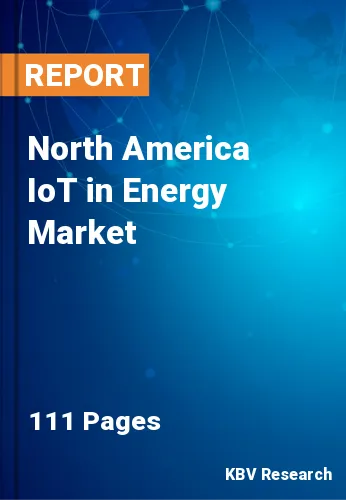The North America IoT in Energy Market would witness market growth of 18.3% CAGR during the forecast period (2022-2028).
Hardware consists of smart thermostats, EV charging stations, smart metres, and other devices. In recent years, utility companies have implemented smart metres as among the most prominent IoT devices. These devices can connect buildings to the smart energy grid, enabling companies to regulate energy flow more effectively. Smart cities also make use of smart metres. Businesses can access rich, real-time data from Internet of Things (IoT)-capable smart metres to enhance service while reducing costs and boosting profits. In addition, these contribute in efficient load balancing and the elimination of power outages, energy distribution simplification via more accurate predictions, and dynamic pricing by increasing or decreasing prices based on real-time demand.
By updating to smart metres & grids, a number of governments are aiming to utilize IoT to facilitate the expansion of localized green energy generation. The US Department of Energy, for instance, is developing a smart grid that will enhance the use of green energy simultaneously reducing prices. Additionally, these reasons force energy companies to engage in IoT technology in order to remain competitive.
Canada is among the world's leaders in the use of renewable, clean energy. In 2019, wind, hydro, solar, and other sources like biomass, geothermal, and marine/tidal wave energy accounted for around 65 percent of the total power generation. Generally, hydropower has been Canada's primary source of energy, generating over 60% of the nation's electricity.
The US market dominated the North America IoT in Energy Market by Country in 2021; thereby, achieving a market value of $93.3 billion by 2028. The Canada market is estimated to witness a CAGR of 21% during (2022 - 2028). Additionally, The Mexico market would showcase a CAGR of 20% during (2022 - 2028).
Based on Application, the market is segmented into Oil & Gas, Smart Grid, Coal Mining and Others. Based on Network Technology, the market is segmented into Radio Network, Cellular Network and Satellite Network. Based on Component, the market is segmented into Solution and Services. Based on Organization Size, the market is segmented into Large Enterprises and SMEs. Based on countries, the market is segmented into U.S., Mexico, Canada, and Rest of North America.
Free Valuable Insights: The Global IoT in Energy Market is Estimated to reach $357.4 Billion by 2028, at a CAGR of 19.7%
The market research report covers the analysis of key stake holders of the market. Key companies profiled in the report include Accenture PLC, IBM Corporation, Cisco Systems, Inc., Hewlett-Packard Enterprise Company, Intel Corporation, SAP SE, Schneider Electric SE, Robert Bosch GmbH, Google LLC and HCL Technologies Ltd. (HCL Enterprises).
By Application
By Network Technology
By Component
By Organization Size
By Country
Our team of dedicated experts can provide you with attractive expansion opportunities for your business.

